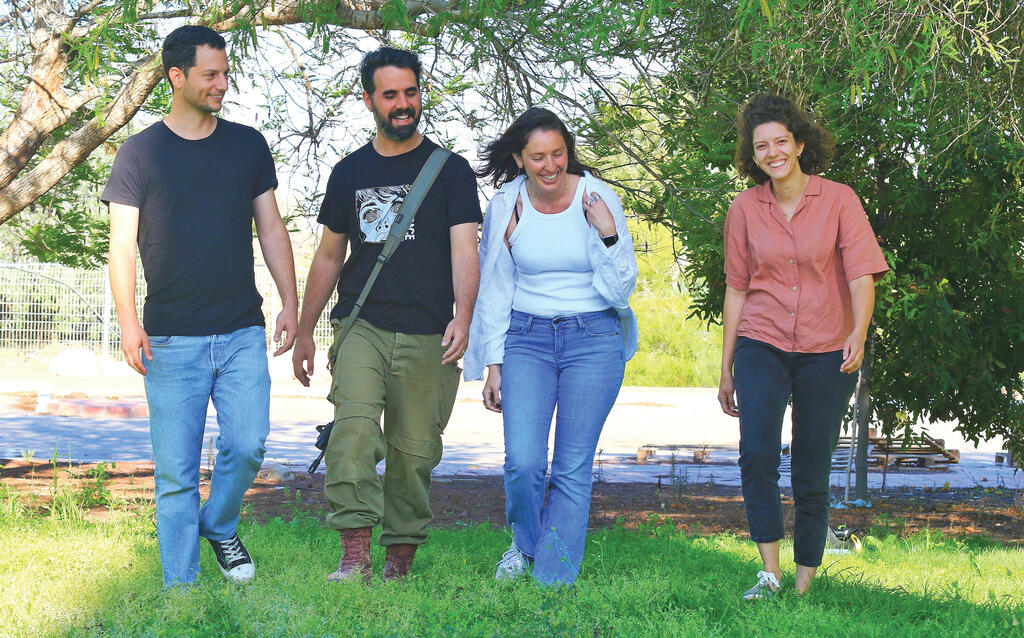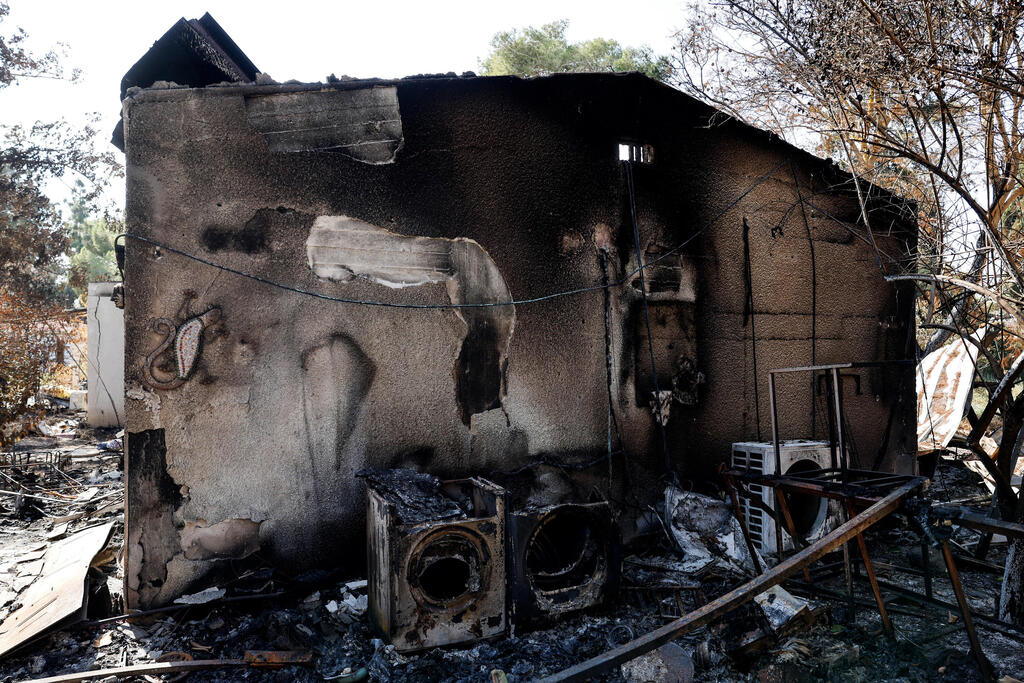Maya lived in Florentin until the war broke out. Chen decided to leave Haifa in the middle of his reserve duty. Moran deepened his roots in Shaar HaNegev, and the kibbutzim in Eshkol are competing over where Gefen will move. Dozens of young people seek to establish their homes in the Western Negev and help rebuild the region: "I can't imagine myself going back to Tel Aviv and leaving everything here."
These young Jewish National Fund USA-MAKOM volunteers are the 'pioneers' committed to renewing this area. They are driven by a sense of purpose and community, which reflects a deep understanding of solidarity. This reflects the resilience and determination of these new residents.
"I had a complete life in Tel Aviv, with all my friends living there. I had a fixed and organized daily routine. It's not easy to get up and detach yourself from that," says Maya Rosek, originally from Kfar Saba. In recent years, she lived in Tel Aviv's Florentin neighborhood, where everything happens for people her age, close to workplaces and entertainment venues, with an atmosphere of freedom and fun. Today, her direction has changed completely - southward, to Israel’s Gaza-border communities.
The war caught her in the middle of a yoga class in India, and three days later, she was already on her way to Eilat to assist in caring for the evacuees. "I had just quit my job at the startup company I was working for. I was in between, unsure exactly what I wanted, so I went to India to think a little about the future and plan. In the middle of yoga class, I saw my phone wouldn't stop flashing. Suddenly, messages started popping up about what was happening in the South. I understood there were also rockets launched at Tel Aviv, and something big was happening in the country. I quickly packed up from there. After two and a half days, when all the Israelis were gathered, I realized I was going back," she recounts.
"It was after I learned that the late Staff Sergeant Yaron Shay had fallen in battle against terrorists in Kerem Shalom. Yaron was a youth I mentored in the Scouts, and we were very close, as was his family." Shay, the son of former Minister Yizhar Shay, was a soldier in the Nahal Reconnaissance Battalion and was killed in a battle against dozens of terrorists who infiltrated Kerem Shalom on the day of the massacre. "I immediately returned to the country. On October 10, I had already landed in Israel. I had to do something; I couldn't just sit at home while the country was burning."
"A friend called me and said she had something interesting for me. She gave me the phone number of the head of the Education Department of the Eshkol Regional Council, where most of the communities affected on October 7 belong. He was looking for an assistant. We spoke for a few minutes, and that was it. I bought a plane ticket to Eilat and went to the hotels where the evacuees stayed. When I returned from India, I packed four pairs of jeans and shirts. I didn't know where I was going or what awaited me."
According to Maya, "All the communities from the towns were scattered across about 30 hotels in Eilat, the Arava, and the Dead Sea. I have a background in operations and worked many years in the Scouts, so I immediately stepped into the role. From here to there, I lived in a hotel in Eilat for four months and worked from morning until night. The mission was to set up educational frameworks for the evacuees, but in practice, we were on the Eilat, Arava, and Dead Sea axis. In the early days, my employers felt it was important to remind me that the situation here was very complex, given the atrocities that had occurred in the communities and the significant trauma. I didn't have any hesitation at all. It felt like the right time for me to participate in this."
"I'm not looking for comfort, It's a kind of pioneering"
This was a turning point in Maya's life. Still, it turns out it was also a moment that connected many other young people like her to Zionism, modern pioneering, and contributing to society. This is the story of a group of young people who came to the southern region because of the war and fell in love with the place. Now, they are looking for where to establish their homes in the area and inviting other young people who want to join the mission of rehabilitating the Gaza Envelope.
The extended stay with the evacuees from the Eshkol region touched Maya's heart, and she became a part of them, even though she wasn't in the country during the terror attack. In February, after the IDF allowed a return to some communities, Maya began working in the Education Department of the Eshkol Regional Council. After getting to know the people at the evacuation centers, she fell in love with the region and understood that this would likely be her home soon and perhaps even in the distant future. She has not yet decided which town to settle in, but it's only a matter of time.
Although I wasn't here at the moment of horror, the encounters connected me to the events. Something about this story became my story.
"Today, I identify with the stories that happened to the residents. Although I wasn't here at the moment of horror, the encounters connected me to the events. Something about this story became my story. I wasn't here before, maybe once or twice when I came to see the anemones. Today, I feel the feedback from the public, a lot of appreciation, and that encourages me to be here. Our mission today is to take care of the people in the evacuation centers and, of course, to operate the education systems in the area that have returned to work. I constantly think about the fortitude of the education staff who work alongside me. It's just wild. People who are so dedicated, without whom nothing would have happened."
Maya began to feel that she hadn't come to the South by chance, and now her dream is for more young people to go and live in the area and integrate into the communities that need strengthening. "Slowly, as I entered this period, something in the area touched me. Some inner voice told me, 'Rebuild yourself.' Today, I understand that I want to take part in this. I can't imagine returning to Tel Aviv and leaving everything here.
"I'm not looking for a nice, comfortable apartment, but rather people who will be here and want to join and participate. A kind of pioneering. A group of young people who want to integrate into local communities has formed. It's not just a move but activism. We understand that there are many young people in the 25-35 age range for whom this war somehow changed their lives. Some people returned from 200 days of reserve duty, and suddenly, their jobs seemed meaningless, and they couldn't see themselves working in an office again. They are looking to do something meaningful and value-driven. First and foremost, I want to connect more young people with energy to this place. This area needs these people."
Maya said many open positions have already been posted in education and care, but "there are still many more jobs and projects in all areas. This is an opportunity to influence the future. And there is a response. We've had a few meetings, including one on Zoom, and more than 200 young people have registered their interest. This is just the beginning."
Groups of young people whose lives were changed by the war
Maya is not the only harbinger of young people who see their future in the Gaza border communities. Among her partners in the initiative are many who came because of the war and decided to stay due to their connection to the place.
Chen Shamir, 38, originally from Haifa and the father of a four-year-old daughter, currently serves in reserve duty with the 162nd Armored Division. He is leading the group, and the vision is being realized: to encourage more young people to move and live in the Gaza Envelope and, in due course, also in the northern border region. "It's about being part of something big and special, even historic," Chen says.
Moran Lish, 30, originally from Kibbutz Kinneret, now lives in Beersheba and works in education for the Shaar HaNegev Regional Council. He fell in love with the area years ago. The war only strengthened his desire to settle in the region. "We saw how, in this war, there was a mass mobilization of the people of Israel; everyone rallied. Now, with that same energy, we want to take it one step further and get people to settle here. I believe it's possible. There is tremendous potential. We will form groups of young people whose lives were changed by this war and integrate into the communities."
Gefen Gabrieli, 31, a close friend of Maya's from Kfar Saba, also joined the initiative. She is a project manager for the school principals of the Eshkol Regional Council and currently lives in a hotel on the Dead Sea with evacuees from Kibbutz Bari. Even without visiting too much of the area, she had already fallen in love and decided to relocate shortly. She will work as a teacher in one of the local authorities' schools in the coming year.
"I met the evacuees in the most difficult moments of their life. I was with them, and they entered my heart. Before the war, I was on a mission in the US and did not know the area. Today, I am part of the community. Everything that happened and all the treatment afterward just connected me to the place until I could no longer think of another place," she said.
"When I meet with the residents and tell them that I'm moving to the area, they literally compete among themselves as to which settlement will take me. It's unusually exciting," she added. "If the abductees don't return, real rehabilitation will not begin here. We won't be complete without them.




